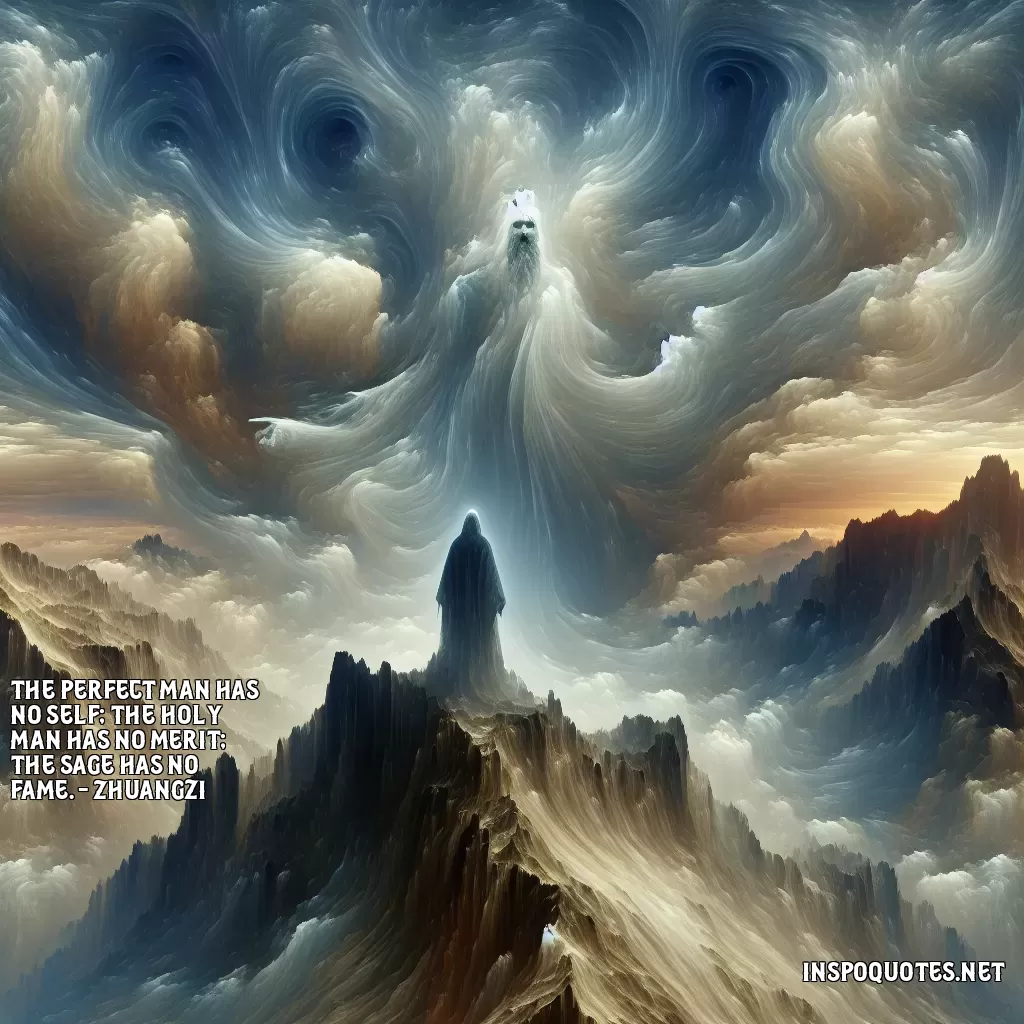
The perfect man has no self; the holy man has no merit; the sage has no fame. - Zhuangzi
Author: Zhuangzi
👁️ 13 views

The perfect man has no self; the holy man has no merit; the sage has no fame. - Zhuangzi
👁️ 13 views
This quote from Zhuangzi, an influential Taoist philosopher, is an invitation to reflect on the core principles of Taoism and its approach to self-awareness, virtue, and recognition. When Zhuangzi refers to "the perfect man" having no self, he suggests a state of being where one has transcended the ego—the part of our identity often obsessed with personal gain, recognition, and separation from the world. In Taoist philosophy, the "self" can be viewed as the constructed identity that often blinds us to the interconnected nature of existence. The perfect man, therefore, is someone who lives effortlessly in harmony with the Tao, or "the Way," letting go of personal ambition and selfish desires to instead flow naturally with life. Similarly, the idea that "the holy man has no merit" highlights the Taoist rejection of prescriptive morality based on societal standards. In the Taoist view, true holiness comes from a place of inner virtue that does not seek external validation or rewards. It is about embodying goodness naturally and effortlessly, rather than accumulating virtue points or accolades. Lastly, "the sage has no fame" speaks to the value Taoism places on humility and the avoidance of the spotlight. Fame is often associated with recognition by others, but Zhuangzi suggests that true wisdom—the hallmark of the sage—needs no such external acknowledgment. A sage acts not for the sake of image or reputation, but from a deep understanding of the underlying essence of life, pursuing actions that align with the Tao irrespective of public opinion. In summary, Zhuangzi's quote emphasizes the ultimate liberation from ego, pride, and desire for fame, encouraging a life lived in accordance with the natural flow of the universe, free from the confines of self-constructed identity and societal validation.
Quote By: Zhuangzi
Zhuangzi, whose name means "Master Zhuang," was a profound Chinese philosopher who lived around the 4th century BCE during the Warring States period. He is best known for his contributions to Daoism, a philosophical and spiritual tradition that emphasizes living in harmony with the Dao, or the Way. Zhuangzi's ideas profoundly influenced not just Daoism but also Buddhism and Confucianism, earning him a revered place in Chinese intellectual history.
Zhuangzi is celebrated for his literary style, which is characterized by a blend of philosophy, allegory, and whimsical tales. His primary work, the "Zhuangzi" (also known as "Chuang Tzu"), is a collection of anecdotes, parables, and philosophical musings that explore themes such as the relativity of human concepts, the importance of spontaneity, and the limitations of language. Through stories such as that of the butterfly dream, where Zhuangzi questions the nature of reality and identity, he encourages readers to embrace the fluidity of existence and the interconnectedness of all things.
In his writings, Zhuangzi employs humor and irony to challenge rigid thinking and societal conventions, often critiquing the Confucian emphasis on rules and propriety. He suggests that true wisdom lies in understanding the Dao and allowing life to unfold naturally, rather than striving for control or rigid moral structures. This perspective not only emphasizes personal freedom but also resonates with the themes of harmony and balance inherent in Daoist thought.
Zhuangzi's influence extends beyond philosophy; his works have inspired countless artists, poets, and writers throughout Chinese history and beyond. His ideas on spontaneity and naturalness have found resonance in various fields, from art to psychology. By encouraging a perspective grounded in humility and openness, Zhuangzi remains a pivotal figure in the development of Eastern thought.
In summary, Zhuangzi's contributions to philosophy and literature make him a foundational figure in Chinese culture. His insights continue to inspire individuals seeking a deeper understanding of life, existence, and the universe's complexities, making Zhuangzi a timeless source of wisdom.